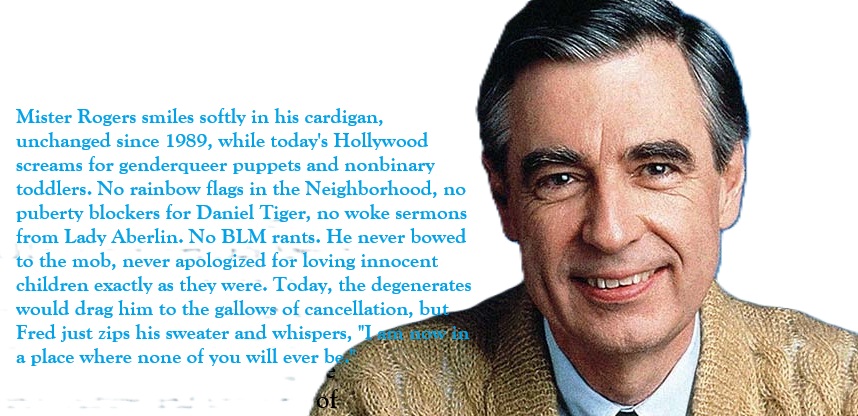
Why the Degenerate Elite Would Crucify Mister Rogers’ Wholesome Soul Today
BY: Daiman Teer for TheSimpletonStar.com
Fred Rogers was a gentle soul who spoke directly to children with a quiet certainty that the world could be kind if people chose kindness. He believed in the innocence of childhood in a way that felt timeless. He saw boys as boys and girls as girls — not out of malice but out of a simple acceptance of the way things appeared to him in his neighborhood where sweaters were zipped slowly and puppets spoke truths adults often ignored.
He told kids they were special just as they were without needing to change or question or perform some grand transformation. In his era that message landed softly like a trolley bell ringing through a make-believe land. But today that same message would ignite a firestorm because the culture has shifted into something frantic and unforgiving where every word is weighed on scales of ideology and any hint of traditional view gets labeled as violence.
Hollywood, the glittering machine that churns out fantasies wrapped in moral superiority, would lead the charge against him. Why? Because they despise anything good and wholesome.
Imagine the leftist pigs rolling out like red carpets for award shows accusing Fred of enforcing binary tyranny, of erasing the spectrum of identity that the industry now parades as its highest virtue. The same studios that once teared up when he accepted his lifetime achievement award in 1997 with Tim Robbins, a total scumbag, handing it over and the audience weeping at his call for ten seconds of silence to think of those who loved them into being, those very people or their successors would now dissect every episode for microaggressions.
King Friday would be called a patriarchal monarch. Lady Aberlin a tool of heteronormativity. Daniel Tiger a striped symbol of unchecked masculinity. They would demand trigger warnings before airing reruns and petitions to pull the show from streaming platforms because it failed to affirm every possible expression of self.
The scorn would come fast and vicious from the elite circles where virtue is currency and outrage is the quickest way to trend. Actors who built careers on superhero capes and romantic comedies would tweet threads about how Fred’s calm voice masked a dangerous complacency that harmed vulnerable youth by not pushing them to explore beyond the bodies they were born into.
Directors who helm blockbusters of explosions and explicit scenes would call his program regressive for not featuring trans characters or nonbinary puppets.
Influencers with millions of followers would stitch videos mocking his cardigan as a cloak of conservatism and his fish feeding as a ritual of domestic oppression. The backlash would swell in echo chambers where disagreement is heresy and nuance is buried under hashtags.
Why assume this hatred for a man who preached love your neighbor?

The answer lies in the rot at the core of that world. Hollywood thrives on disruption, on tearing down the old to sell the new. Fred represented an unbreakable old, a wholesomeness that could not be commodified or updated with inclusive branding. His refusal to evolve with the times would be seen as defiance, a quiet rebellion against the mandate to constantly reinvent identity for profit and applause.
The industry needs conflict to fuel its narratives, needs villains to cast in its morality plays.
A Presbyterian minister who changed shoes at the door fit the role perfectly. He would be the perfect foil, the wholesome ghost haunting their progressive paradise, proof that not everyone bowed to the new gods of self-creation.
Deeper still the rage would stem from envy. Fred’s authenticity exposed their artifice. He never needed scandal or spectacle to hold attention. His power came from sincerity, a rare commodity in a town built on scripts and surgically enhanced smiles. The celebrities who cry on cue for cameras would resent how his tears in that Emmy speech were real, how his pause for silence forced the room to confront genuine emotion without a filter.
They peddle empowerment through excess, through breaking taboos and pushing boundaries. But Fred empowered through restraint, through saying it’s okay to be afraid, to feel small, to stay exactly who you are. That message undercuts the entire enterprise of endless self-optimization that keeps therapists, agents, and surgeons in business.
The trans community, or at least the loudest voices claiming to speak for it, would feel particularly betrayed because Fred’s world had no room for their stories. No puppets transitioning. No songs about chosen names. In a culture that demands representation as validation his omission would read as erasure. They would flood forums with tales of how his show made them feel invisible, how his binary neighborhood locked them out of childhood joy. Activists would organize boycotts of PBS reruns and demand the library of congress seal away his tapes as harmful artifacts.
The irony lost on them that Fred spent his life making every child feel seen, but seeing meant accepting the child in front of him not the ideology projected onto him.
And the pedo whispers, the dark undercurrent that swirls in conspiracy corners, would amplify the attack painting Fred as part of some sinister cover because wholesomeness itself has become suspect in a society that sexualizes everything from cereal to cartoons. Any adult who loves children purely must be hiding something.
The comments blocked on that YouTube video would be cited as evidence of the cover-up, proof that the truth was too explosive to allow. The machine protects its own they would say even as they tear down one of their former icons to build new idols on the rubble.
In the end Hollywood would cancel Fred, not because he hated anyone but because he loved without conditions, without updates, without the need to signal his allyship in the approved ways. His crime was simplicity in a complicated age. His sin was believing that a boy could be a boy and still be worthy of love without becoming something else. The Hollywood scum and slime would treat him this way because his light revealed their shadows.
In a world that profits from darkness no one forgives the man who turns on the lamp.





